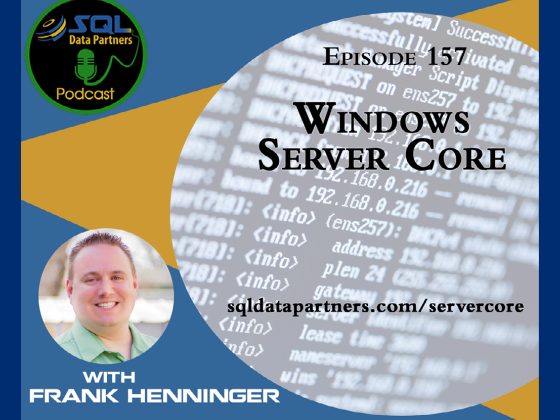Windows Server Core
I can still remember working in high school when you had to ‘dial in’ to the internet and Microsoft bought the rights to the Rolling Stones song ‘Start Me Up’ for the release of their highly anticipated software Windows 95. It was a complete game changer for me and shaped my professional life with the releases of the Windows Server Operating System. While you could never just wing it, the GUI provided a rich interface and the ability to explore features without having to know all the syntax to execute the functionality. You can image the surprise I felt when Microsoft came out with Windows Core–an operating system with no GUI. While you may not have adopted Windows Core yet, our guest, Frank Henninger, suggests you should reconsider. We chat with him about the benefits, some of the challenges, and how we can better take advantage of using Windows Core.
Episode Quotes
“One of the nice things about Server Core is if you take out all of the overhead that the operating system requires for the desktop, you can actually run more servers.”
“Server Core is actually less [of] an exposure from a security standpoint… the surface area is reduced.”
“You can get the database engine, you can get replication running, full text search, SSIS, and Analysis Services are also supported.”
“PowerShell’s your best friend when it comes to Server Core. And when it comes to SQL Server and PowerShell, get to know DBATools.”
Listen to Learn
00:38 Intro to the guest and topic
01:29 Compañero Shout-Outs
02:04 SQL Server in the News
03:59 Why Windows Server Core? For one, a dramatic reduction in space needed
05:33 What is not included with Server Core?
07:01 Windows Server Core provides less of a security exposure
08:03 How does using a command line change your SQL Server experience?
09:40 How patching and updates work with Windows Server Core
11:28 Who will have an easier time adjusting?
12:58 The first time you install Windows Server Core
13:34 Installing SQL Server on Server Core
16:33 All of the basic things of SQL Server work on Windows Core…except SSRS
17:21 The minimum first steps to managing your server(s) remotely, as you should be
18:27 This is all remote without RDP…here are a few caveats
20:25 Windows Server Core and containers
22:24 In-house applications or web applications running off Server Core machines
23:15 Depending on the age and version, most servers will work on Windows Server Core
24:23 Using Server Core could save you money
24:51 PowerShell can be your BFF and get to know DBATools…they’ll save your bacon
26:04 SQL Family Questions
32:09 Closing Thoughts
Credits
Music for SQL Server in the News by Mansardian
Our Guest

Frank Henninger
Frank is the Database Administrator for a third-party insurance administrator where he manages 75+ instances of SQL Server. Frank is a Microsoft Certified Professional who has more than 10 years managing Oracle, DB2 and SQL Server instances. He’s contributed to the dbatools and dbachecks powershell projects and is based in central Illinois. He and his wife are proud the proud parents of three children seven and under, so they desperately need more sleep. You can connect with him on twitter @OsirisDBA.
Meet the Hosts

Carlos Chacon
With more than 10 years of working with SQL Server, Carlos helps businesses ensure their SQL Server environments meet their users’ expectations. He can provide insights on performance, migrations, and disaster recovery. He is also active in the SQL Server community and regularly speaks at user group meetings and conferences. He helps support the free database monitoring tool found at databasehealth.com and provides training through SQL Trail events.

Eugene Meidinger
Eugene works as an independent BI consultant and Pluralsight author, specializing in Power BI and the Azure Data Platform. He has been working with data for over 8 years and speaks regularly at user groups and conferences. He also helps run the GroupBy online conference.

Kevin Feasel
Kevin is a Microsoft Data Platform MVP and proprietor of Catallaxy Services, LLC, where he specializes in T-SQL development, machine learning, and pulling rabbits out of hats on demand. He is the lead contributor to Curated SQL, president of the Triangle Area SQL Server Users Group, and author of the books PolyBase Revealed (Apress, 2020) and Finding Ghosts in Your Data: Anomaly Detection Techniques with Examples in Python (Apress, 2022). A resident of Durham, North Carolina, he can be found cycling the trails along the triangle whenever the weather's nice enough.
Want to Submit Some Feedback?
Did we miss something or not quite get it right? Want to be a guest or suggest a guest/topic for the podcast?
